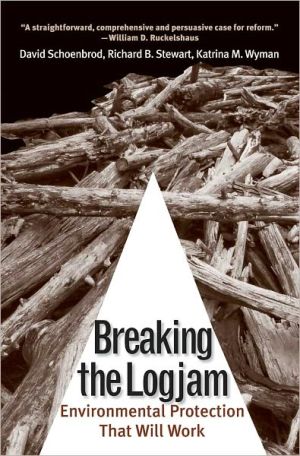Breaking the Logjam: Environmental Protection That Will Work
After several decades of significant but incomplete successes, environmental protection in the United States is stuck. Administrations under presidents of both parties have fallen well short of the goals of their environmental statutes. Schoenbrod, Stewart, and Wyman, distinguished scholars in the field of environmental law, identify the core problems with existing environmental statutes and programs and explain how Congress can fix them. Based on a project the authors led that incorporated...
Search in google:
After several decades of significant but incomplete successes, environmental protection in the United States is stuck. Administrations under presidents of both parties have fallen well short of the goals of their environmental statutes. Schoenbrod, Stewart, and Wyman, distinguished scholars in the field of environmental law, identify the core problems with existing environmental statutes and programs and explain how Congress can fix them. Based on a project the authors led that incorporated the work of more than fifty leading environmental experts, this book is a call to action through public understanding based on a nonpartisan argument for smarter, more flexible regulatory programs to stimulate the economy and encourage green technology. Stephen L. Kass - New York Law Journal "A thought-provoking book and a welcome opportunity to grapple with some of the central environmental issues confronting our nation."--Stephen L. Kass, New York Law Journal
Preface: The Logjammed Congress ix\ Introduction\ 1 Coping with Complexity: The Schooling Fish 3\ 2 How We Got Lost in Complexity: The Mistaken Squirrel 19\ Reform\ 3 Principles of Reform: The Adapting Beaver 33\ 4 Climate Change: The Combustible Rock 57\ 5 Air Pollution: The Old Body 73\ 6 Lands, Waters, and Other Natural Resources: The Organized Ant 99\ 7 Smarter Government: The Tool-Wielding Monkey 117\ Conclusion\ 8 Breaking the Logjam: "My Antelope" 145\ Notes 153\ Acknowledgments 189\ Index 193
\ New York Law JournalA thought-provoking book and a welcome opportunity to grapple with some of the central environmental issues confronting our nation.—Stephen L. Kass, New York Law Journal\ \ — Stephen L. Kass\ \ \ \ \ RegulationA newly evolving breed of environmental pragmatists would do well to consider the recommendations that Schoenbrod, Stewart, and Wyman make in Breaking the Logjam.—Robert H. Nelson, Regulation\ \ — Robert H. Nelson\ \ \ \ Environmental ForumAvoiding the polarities of environmental rollback or defending every jot and ittle of legislation passed almost four decades ago, [Breaking the Logjam] offers solid reform for reconciling environmental protection with economic growth by means of less intrusive, more effective regulation.—Tracy Mehan, Environmental Forum\ — Tracy Mehan\ \ \ \ \ \ Choice"Schoenbrod, Stewart and Wyman perform a great service with their new book. . . . [They] give readers a strong framework for rethinking the environmental regulatory structure and a possible means to get environmental protection moving again."—Choice\ \ \ \ \ The Environmental ForumBreaking the Logjam . . . offers a range of realistic, informed proposals for reform. . . . It offers solid reform for reconciling environmental protection with economic growth by means of less intrusive, more effective regulation.—G. Tracy Mehan III, The Environmental Forum\ — G. Tracy Mehan III\ \ \ \ \ \ New York Law Journal"A thought-provoking book and a welcome opportunity to grapple with some of the central environmental issues confronting our nation."—Stephen L. Kass, New York Law Journal\ \ \ \ \ \ William D. Ruckelshaus"Our environmental laws badly need re-thinking. This book makes that case and then charts a course for action. A straightforward, comprehensive, and persuasive case for reform."—William D. Ruckelshaus, Administrator of the U.S. Environmental Protection Agency, 1970-1973 and 1983-1985\ \ \ \ \ James Gustave Speth"The old environmental laws and approaches have run their course, and we urgently need an intensive period of environmental law reform. That's the message of this insightful, stimulating book. . . . A must read."—James Gustave Speth, author of Red Sky at Morning and The Bridge at the Edge of the World\ \ \ \ \ William K. Reilly"Breaking the Logjam is a thoughtful, deliberative, easy-to-read digest about the state of environmental policy today. With specific proposals, the authors add their authoritative voices to the call for a more robust statutory framework to enable the country to achieve further environmental progress, which at the moment is stalled and needs to be rekindled."—William K. Reilly, Administrator, U.S. Environmental Protection Agency, 1989-93\ \ \ \ \ Fred Krupp"The authors remind us that a number of our environmental laws are not achieving their important goals. Breaking the Logjam documents the power of well-regulated markets to achieve significant improvements in air quality and challenges us to incorporate those lessons more broadly, hopefully provoking a valuable national discussion on these complex issues."—Fred Krupp, President, Environmental Defense Fund\ \ \ \ \ Richard J. Lazarus"Ambitious, balanced, and engaging, Breaking the Logjam itself breaks new ground by offering Congress a timely and much-needed blueprint for addressing the nation's most pressing environmental problems, including climate change."—Richard J. Lazarus, author of The Making of Environmental Law\ \ \ \ \ Regulation"A newly evolving breed of environmental pragmatists would do well to consider the recommendations that Schoenbrod, Stewart, and Wyman make in Breaking the Logjam."—Robert H. Nelson, Regulation\ \ \ \ \ \ Environmental Forum"Avoiding the polarities of environmental rollback or defending every jot and ittle of legislation passed almost four decades ago, [Breaking the Logjam] offers solid reform for reconciling environmental protection with economic growth by means of less intrusive, more effective regulation."—Tracy Mehan, Environmental Forum\ \ \ \ \ The Environmental Forum"Breaking the Logjam . . . offers a range of realistic, informed proposals for reform. . . . It offers solid reform for reconciling environmental protection with economic growth by means of less intrusive, more effective regulation."—G. Tracy Mehan III, The Environmental Forum\ \








